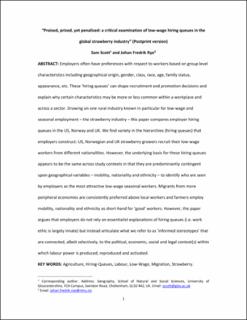Praised, prized, yet penalised: A critical examination of low-wage hiring queues in the global strawberry industry
Journal article, Peer reviewed
Accepted version
Permanent lenke
https://hdl.handle.net/11250/3035083Utgivelsesdato
2021Metadata
Vis full innførselSamlinger
Sammendrag
Employers often have preferences with respect to workers based on group-level characteristics including geographical origin, gender, class, race, age, family status, appearance, etc. These ‘hiring queues’ can shape recruitment and promotion decisions and explain why certain characteristics may be more or less common within a workplace and across a sector. Drawing on one rural industry known in particular for low-wage and seasonal employment – the strawberry industry – this paper compares employer hiring queues in the US, Norway and UK. We find variety in the hierarchies that employers construct: US, Norwegian and UK strawberry growers recruit their low-wage workers from different nationalities. However, the underlying basis for these hiring queues appears to be the same across study contexts in that they are predominantly contingent upon geographical variables – mobility, nationality and ethnicity – to identify who are seen by employers as the most attractive low-wage seasonal workers. Migrants from more peripheral economies are consistently preferred above local workers and farmers employ mobility, nationality and ethnicity as short-hand for ‘good’ workers. We find that employers articulate what we refer to as ‘informed stereotypes’ that are connected, albeit selectively, to the political, economic, social and legal context(s) within which labour power is produced, reproduced and activated.
